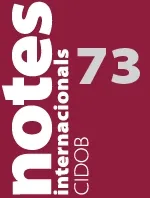Still a Long Way to Go for Tunisian Democracy

Notes internacionals CIDOB, núm. 73
Tunisia remains very dependent on international good will: despite receiving aid and loans worth $1.5bn last year, the growing current account deficit has reduced hard currency reserves to the equivalent of three and a half months cover of imports.
The Minister of Human Rights and Transitional Justice recently stated that rising Islamic violence could well delay elections. The risk of Tunisia slipping into a political and economic quagmire which seriously damages its future stability is real if elections are put off indefinitely.
The Nahda dominated government is also discovering, like its counterparts in Tripoli and Algiers, that that the blow back effect of exporting jihadi activity abroad is nasty.
Never has the need for consensus and serious debate about the future course of the economy been greater: the policies encouraged by the World Bank and the IMF over the past two decades have come unstuck across the Middle East and North Africa.
The budget is being used to distribute handouts to thousands of unemployed but no one is asking how Tunisian graduates who have degrees which are of no use to future employers are going to be put to work.
European political leaders may have no integration process to offer Tunisia – though a little imagination in Brussels might help, but they are helping the country financially, as is the IMF, the World Bank, Japan and the US. All are desperate for a “success” story in at least one of the Arab countries which has overthrown the yoke of authoritarian rule recently.
The turn over of the Compagnie des Phosphates de Gafsa (CPG) and the Groupe ChimiqueTunisien (GCT), the state owned phosphate and fertiliser companies has dropped by two thirds since the revolt which toppled the regime of Zine el Abidine Ben Ali in January 2011. Turnover last year was 900m Tunisian Dinars (TD) compared with TD3bn in 2010. Production of phosphate rock has plunged by 75% over the same period, from 8 to 2m tons while phosphate rock stocks are down to one month’s exports. Foreign competitors, notably the Moroccan Office Chérifien des Phosphates, have replaced CPG and GCT in key export markets such as India and for such highly added value fertilizers such as Diamonium Phosphate, whose exports have dropped by half.
The staff of the two companies has been multiplied by three to 27,000 over the same period as politicians and senior company managers attempt to quell social unrest in the poor southern Tunisian region around Metlaoui where the mines lie and the nearby port of Gabes where they are transformed into fertilizer and shipped abroad. The new staff lack qualifications for what are essentially phantom jobs. Were the story of these two companies whose exports, which account for 10% of the country’s total, have been cut by 60% since 2010, to be repeated across Tunisian industry, bankruptcy would be staring North Africa’s smallest nation in the face. Luckily it is not but the challenges the government faces as it tries to create jobs and make Tunisia attractive to foreign and domestic investors remains daunting.
(read more in the pdf)